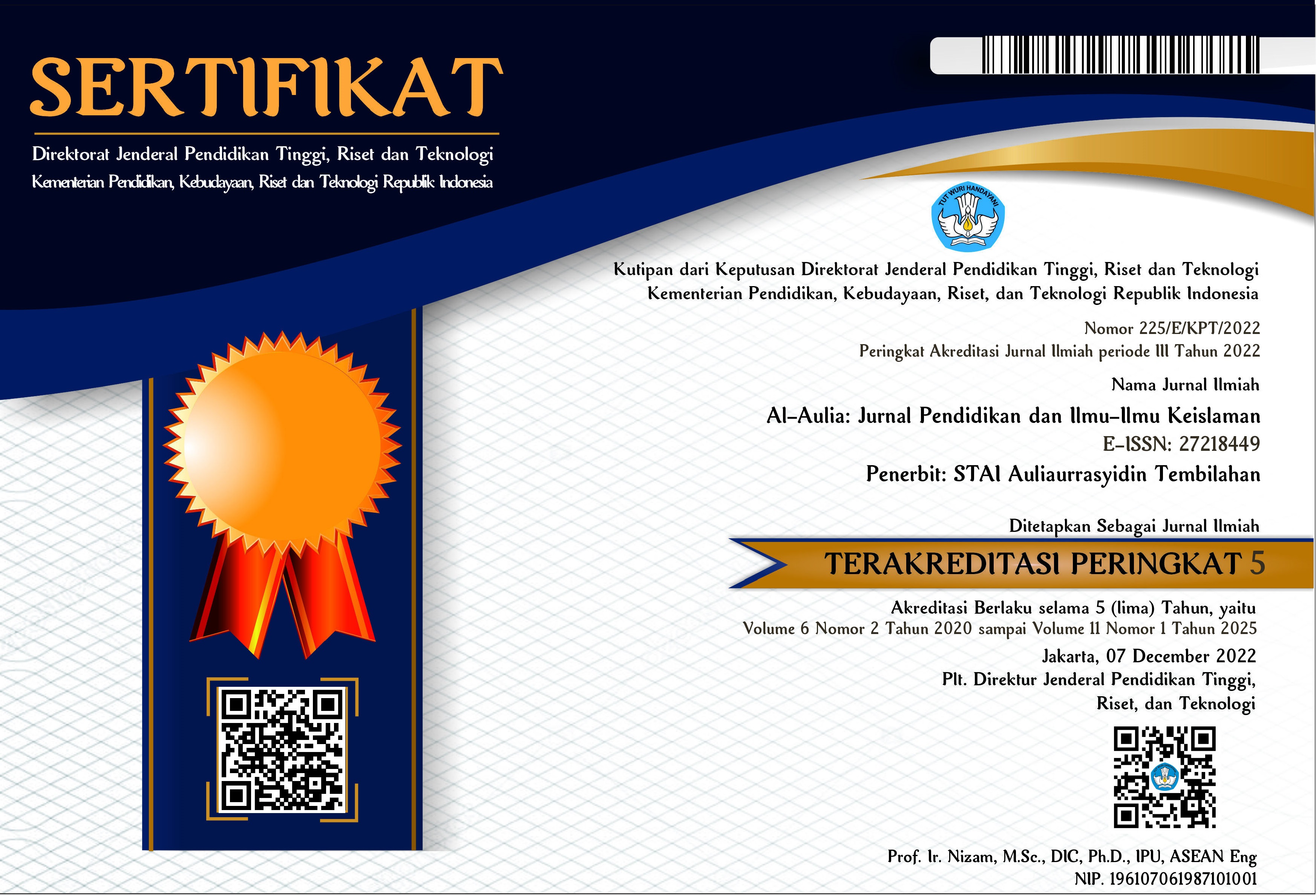Peran dan Kontribusi Pendidikan Agama Islam dalam Pemberdayaan Perempuan di Lingkungan Masyarakat
DOI:
https://doi.org/10.46963/aulia.v10i1.1854Keywords:
Islamic Education, Empowerment Women, ContributionAbstract
Through current approaches in the social, economic and political spheres, recent research suggests Islamic religious education can provide a strong foundation for women in developing their potential and achieving gender equality. This research aims to explore the important role of Islamic religious education in empowering women socially, economically and politically and to provide a deeper understanding of its contribution to enhancing women's participation in public life. This research is a qualitative type of literature study by making library materials as the main data source, using the main reference to the phenomenon of the prophetic era and then correlating it with the related verses and stories listed in the Qur'an. The results showed that Islamic Religious Education has an important role in improving the quality of individuals. In addition, Islamic religious education does not provide rejection of the role of women in any aspect. Therefore, the Qur'an also explicitly says about equality between men and women.
References
Abididn, Z. (2015). Kesetaraan Gender dan Emansipasi Perempuan dalam Pendidikan Islam. Jurnal Tarbawiyah, 2(1), 1–18. https://e-journal.metrouniv.ac.id/tarbawiyah/article/view/420/220
Al Fasya, S., & Harfiani, R. (2023). Implementasi Pendidikan Agama Islam dalam Penanaman Akhlak Siswa Sekolah Darul Muhmin Thailand. Journal on Education, 05(02), 3699–3714. https://doi.org/10.31004/joe.v5i2.1051
Asril. (2016). Membangun Kesadaran Inklusif-Multikultural Untuk Deradikalisasi Pendidikan Islam. Jurnal At-Ta’lim, 15(2), 282-301. https://ejournal.uinfasbengkulu.ac.id/index.php/attalim/article/viewFile/526/476
Bt Mahmud, M., Bazilah Bt Mohd Zain, N. A., & Firdaus Bt Fatah Yasin, R. (2019). Participation of Muslim Women in Islamic Philanthropy in Digital Era: Malaysian Experience. Afkaruna, 15(2). https://doi.org/10.18196/aiijis.2019.0101.165-186
Cahyono, A. D. (2021). (Library Research) Peranan Pengembangan Manajemen Kinerja Tenaga Administrasi Kesehatan terhadap Peningkatan Mutu Pelayanan Kesehatan d Puskesmas. Jurnal Ilmiah Pamenang, 3(2), 28–42. https://doi.org/10.53599
Firmansyah, M. I. (2019). Pendidikan Agama Islam : Pengertian, Tujuan, Dasar, dan Fungsi. Jurnal Pendidikan Agama Islam, 17(2), 79–90. https://ejournal.upi.edu/index.php/taklim/article/viewFile/43562/18093
Haq, A. F. (2020). Gender dan Emansipasi Perempuan dalam Pendidikan Islam. In Jurnal Ilmu Pendidikan Islam (Vol. 04). https://journalfai.unisla.ac.id/index.php/kuttab/article/view/100/92
Karimullah, S. S. (2023). The Role of Islamic Education in Promoting Women’s Empowerment. Jurnal Tarbiyatuna, 4(2). https://doi.org/10.30739/tarbiyatuna.v4i2.2568
Rahmadania, S., Sitika, A. J., & Darmayanti, A. (2021). Peran pendidikan Agama Islam dalam Keluarga dan Masyarakat. Jurnal Edumaspul, 5(2). 221-226. https://doi.org/10.33487/edumaspul.v5i2.1978
Rahmah, S. (2019). Pendidikan dan Kesetaraan Gender dalam Islam di Aceh. Jurnal UIN Ar-Raniry, 5(1), 25–42. https://jurnal.ar-raniry.ac.id/index.php/equality/article/view/5376/3502
Romlah, S. (2023). Pendidikan Agama Islam sebagai Pilar Pembentukan Moral dan Etika. Jurnal Al-Ibrah, 8(30). 67-85. https://doi.org/10.61815/alibrah.v8i1.249
Rusydiyah, E. F. (2016). Pendidikan Islam dan Kesetaraan Gender. Jurnal Pendidikan Agama Islam, 4(1), 21–43. https://doi.org/10.15642/jpai.2016.4.1.20-43
Sari, N. Y., & Wisroni, W. (2020). The Urgency of Parental Guidance for Youth Education in the Belajar Dari Rumah (BDR) Era. SPEKTRUM: Jurnal Pendidikan Luar Sekolah (PLS), 8(3), 309. https://doi.org/10.24036/spektrumpls.v8i3.109565
Wasitohadi. (2014). Hakekat Pendidikan dalam Perspektif John Dewey. Jurnal Satya Widya, 30(1), 49–61. https://doi.org/10.24246/j.sw.2014.v30.i1.p49-61
Yunita, Astika Trisna. (2023). Dinamika Gendre dalam Pendidikan Agama Islam. GUAU: Jurnal Pendidikan Profesi Guru Agama Islam, 3(5), 115-125. https://studentjournal.iaincurup.ac.id/index.php/guau/article/view/1089/945
Downloads
Published
Issue
Section
License
Copyright (c) 2024 Nita Jannatun Ni’mah, Rika Febri Anggani, Siti Nizarotul Fitria, Amalia Fajriyyatin Najichah

This work is licensed under a Creative Commons Attribution-ShareAlike 4.0 International License.
Authors who publish with this journal agree to the following terms:
1. Copyright on any article is retained by the author(s).
2. The author grants the journal, right of first publication with the work simultaneously licensed under a Creative Commons Attribution License that allows others to share the work with an acknowledgment of the work’s authorship and initial publication in this journal.
3. Authors are able to enter into separate, additional contractual arrangements for the non-exclusive distribution of the journal’s published version of the work (e.g., post it to an institutional repository or publish it in a book), with an acknowledgment of its initial publication in this journal.
4. Authors are permitted and encouraged to post their work online (e.g., in institutional repositories or on their website) prior to and during the submission process, as it can lead to productive exchanges, as well as earlier and greater citation of published work.
5. The article and any associated published material is distributed under the Creative Commons Attribution-ShareAlike 4.0 International License







